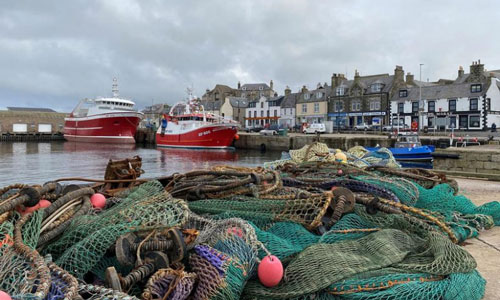London
Britain on Saturday readied armed Royal Navy ships to patrol its fishing waters if tempers flare after a “no-deal” Brexit as a make-or-break deadline approached for talks with the European Union.
Four 80-metre (260-feet) vessels have been placed on standby to guard British waters from EU trawlers in case the two sides decide to abandon efforts to secure a free-trade agreement on Sunday.
The development is part of increased contingency planning on both sides of the Channel, and evokes memories of the “Cod Wars” with Iceland over fishing rights in the North Atlantic in the 1960s and 70s.
Prime Minister Boris Johnson has said it is “very, very likely” the talks will fail, and Britain will revert to World Trade Organisation (WTO) terms with its largest single trading partner.
European leaders have also been told the chances of a deal are slim with both sides at loggerheads over rules to govern fair competition and fishing rights in British territorial waters.
Deal or no deal, Britain will leave the EU single market and customs union on the evening of Dec 31, more than four years after a landmark referendum on membership of the bloc.
Hardline Brexit-supporting Conservative MPs have sought assurances from Johnson that the navy should be deployed to protect British waters.
Lawmaker Daniel Kawczynski said it would help “prevent illegal French fishing” when EU access ends.
Former Tory party chairman Chris Patten voiced concerns about a “runaway train of English exceptionalism” after headlines backing the military threat in the Daily Mail — “We’ll send in gunboats” — and Daily Express — “Gunships to guard our fish”.
“Heaven knows where it is going to take us in the end,” he said, calling Johnson, whose Brexit stance has boosted support for Scottish independence and distanced Northern Irish allies, “an English nationalist”.
Tobias Ellwood, a former British Army captain and now chairman of parliament’s defence select committee, said confrontations in the Channel would only be welcomed by Britain’s enemies.
“We’re facing the prospect of our overstretched Royal Navy squaring up to a close Nato ally over fishing rights,” he told BBC radio.
“This isn’t the Elizabethan times anymore. It’s Global Britain,” he added, referring to the country’s new post-EU foreign policy.
“We need to be building alliances not breaking them apart.” But retired Admiral Alan West, who as chief of naval staff and First Sea Lord from 2002 to 2006 was Britain’s highest-ranking naval officer, said readying the Fishery Protection Squadron was a sensible move in case tensions spill over.
“It’s absolutely appropriate that the Royal Navy should protect our waters if the position is we’re a sovereign state and the government says we don’t want any other nation’s fishing boats there,” he told BBC radio.
The River-class patrol vessels of the Fishery Protection Squadron — the Royal Navy’s oldest frontline squadron with a history dating back more than 500 years — already enforce UK and EU fisheries law.
The Ministry of Defence confirmed it has conducted “extensive planning and preparation” for a range of post-Brexit scenarios from January 1, and has 14,000 personnel on standby to help with the transition.—AFP









